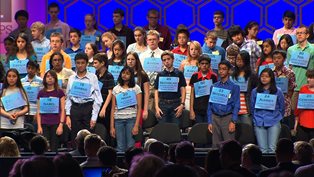 (CNN) -- New York eighth-grader Arvind Mahankali is the fiercest speller around. No word can foil him, as he proved Thursday when he beat out other Scripps National Spelling Bee contestants by spelling "knaidel" correctly.
(CNN) -- New York eighth-grader Arvind Mahankali is the fiercest speller around. No word can foil him, as he proved Thursday when he beat out other Scripps National Spelling Bee contestants by spelling "knaidel" correctly.
"I know this. I got this," he told CNN's "Early Start" on Friday morning, recalling how he confidently steadied himself before enunciating every letter in the Yiddish word of German origin meaning dumpling. When he uttered the final letter, the audience erupted in wild applause.
The 13-year-old is feeling good even though he knows he won't be able to compete again since there's a limit on contestants beyond the eighth-grade.
Mahankali isn't the type of kid who stops at spelling domination.
"Next year I'll try to go somewhere in the Math Olympiad and the Physics Olympiad," he said.
The Bayside Hills, New York, teen, who wants to become a physicist, finished third in two previous national bees. He was eliminated after misspelling words with German roots.
"I thought that the German curse had turned into a German blessing," he said.
It didn't hurt that he studied constantly, telling CNN that he browsed through the dictionary and let his mother quiz him. "My dad collects words. I look up those words and get familiarity with those words."
Ending his Scripps career with a victory means he's "retiring on a good note," he said.
"I shall spend the summer," he said, "maybe (an) entire day, studying physics."
Pranav Sivakumar, a 13-year-old from Tower Lakes, Illinois, finished second. He missed on "cyanophycean." Then Mahankali nailed "tokonoma" and "knaidel," and the rest is history.
The annual contest offers the winner a healthy dose of classroom cred, $32,500 in cash and savings bonds, a trophy and a library of reference materials.
Eleven million schoolchildren participated in preliminaries leading up to the national contest this week. Of those, 281 children made the trip to Oxon Hill, Maryland, outside Washington, for the national bee. Eleven spellers made it through to the finals.
Among them were 63 children who had been to at least one national bee before, and had to prepare for some changes in the rules for this year's events.
For the first time, participants had to demonstrate proficiency in vocabulary in addition to spelling.
Organizers also added an additional computer test for the semifinals, imposed time limits on computer-based spelling and vocabulary tests, and added a rule that resulted in automatic elimination for any participant who misspelled a word on stage in the second or third rounds.
CNN's Athena Jones and Michael Pearson contributed to this report.
- Home
- News
- Opinion
- Entertainment
- Classified
- About Us
 MLK Breakfast
MLK Breakfast- Community
- Foundation
- Obituaries
- Donate
04-19-2024 10:01 pm • PDX and SEA Weather






















































































































































































































































































































